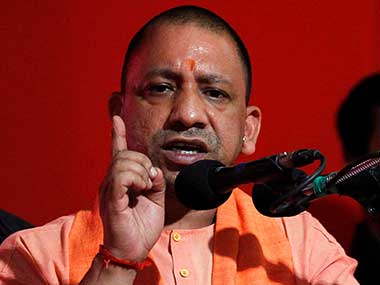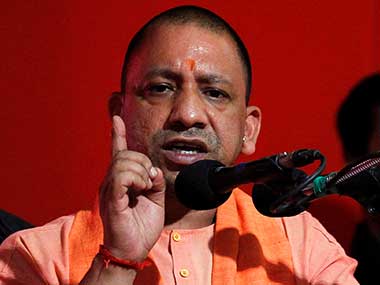Editor’s Note: In March, Yogi Adityanath will complete two years as Uttar Pradesh chief minister. Ahead of that milestone, the unlikely administrator of India’s largest state speaks to Firstpost about the challenges he faced changing Uttar Pradesh’s perception, being led down the garden path by bureaucrats and his interpretation of the Constitution. [caption id=“attachment_4618241” align=“alignleft” width=“380”]  File image of Uttar Pradesh chief minister Yogi Adityanath. Reuters[/caption] Bungalow No. 5, Kalidas Marg is the official residence of the Uttar Pradesh chief minister. The common spectacle here is of people milling around the bungalow, luxurious cars flitting in and out and bureaucrats carrying files in perennial obsequiousness. I did not expect anything different when I reached the chief minister’s residence on 28 December for an interview with Yogi Adityanath. During the stints of Mulayam Singh Yadav, Mayawati or Akhilesh Yadav, entering the bungalow even for scheduled appointments was often more complicated than accessing the prime minister’s residence. Barring a privileged few, the rest had to negotiate a labyrinth of officialdom and obdurate police constables to access the ultimate portal of power in Lucknow. I was mentally prepared for an elaborate security drill when our car arrived outside the gate. A police officer came up. I identified myself and told him I had come for an appointment with the chief minister. “Yes sir, give me a minute,” he said politely, giving me a culture shock. He flagged us in within the minute. I looked around and was surprised even more. But for a few senior police officers exiting with their spouses, the place was devoid of people. The officers had a lunch (pure vegetarian) meeting with the chief minister as part of the police week celebration. I was ushered into a waiting lounge after a quick frisk. The lounge, which used to be bustling with power-brokers and favour-seekers, was empty. An attendant served me tea while an officer told me that the interview would begin shortly. As I waited, I could not but be impressed by this discernible change in political culture at the official residence of the state’s chief executive. Austerity was in the air. I had visited the Gorakhnath Peeth in Gorakhpur multiple times for election tours. The Kalidas Marg house appeared like a polished annex of the Math. In my brief and often casual conversations with Adityanath during my Gorakhpur tours or in Parliament, I had an image of him as a dour young sanyasi whose politics revolved around countering the powerful Brahmin underworld of Gorakhpur. Since Gorakhdham Peeth is the revered temporal seat of the Nath Sampradaya — which has overweening social and economic influence on OBCs and SCs — his victory was often attributed more to religiosity than political skills. Apocryphal stories circulate in Gorakhpur and adjoining areas about his aggression and his skills in organising an army of die-hard loyalists. In essence, to me he did not appear to be part of the mainstream politics and I was skeptical of his administrative abilities. As Adityanath walked in, I was keen to understand the mind of this unlikely administrator of India’s largest state now that he is approaching the two-year milestone in that role. Is there something more to the man than the regular rabble rousing about gau, beef, mandir and Muslim? A stickler for time, he arrived just a few minutes behind the clock. The moment he sat down he was ready for business, no small talk. I began the interview by asking him what difference he had made to Uttar Pradesh. Pat came the reply. “I have changed the perception about Uttar Pradesh,” he claimed. “Two years ago, Uttar Pradesh shared a largely credible perception of being a state beset by corruption, lawlessness, anarchy and riots: not only within the country but also internationally. I will be completing two years in March. During my tenure, there have been not riots. We have controlled organised crime to a large extent. We have strengthened the rule of law. Barring a few cases of family feuds or personal enmity, people in the state are not insecure. This change in perception has attracted investment. Today, big industrialists in India and from all over the world are keen to invest in Uttar Pradesh. As we complete two years in March, the state would have attracted investment over Rs 2 lakh crore which is unprecedented.” Adityanath also fired off statistics about the progress made in agriculture, industry and social sector. Defying his image of an archetypal monk with spiritual pursuits, Adityanath covered a range of issues to show he was in total control of the State machinery. He talked about “mapping, branding and marketing” of a product with the finesse of a management graduate while talking about his ambitious “one district one product” scheme. In his early days as chief minister, Adityanath admitted that some bureaucrats did try to lead him up the garden path. But he was apparently up to speed with their games: take for example, Uttar Pradesh’s “dark zones”. In the early 90s, when soft drink majors wanted to set up shop in Uttar Pradesh, they were not allowed into these 200 blocks because of the bad state of their ground water systems. These blocks came to be known as “dark zones”. But a classification brought in to keep ground-water guzzling soft drink makers at bay somehow morphed into a blanket ban on tube-wells denying farmers water for irrigation. “You will be surprised to know the extent to which people have been cheated in the past. Let me explain by showcasing one episode. In Uttar Pradesh, nearly 200 blocks (almost 25 percent of the rural parts of the state) were declared dark zones by past regimes. Farmers were prevented from installing pumping sets to irrigate their fields, and there were no alternative sources of irrigation. When I asked on what basis these orders were issued, I was wrongly briefed about a court order. I asked for the file which came to me after six months after a lot of persuasion. Not only delay, they prevaricated and finally gave me the file which referred to an order in the early 90s that restricted companies such as Coca Cola and Pepsi Cola from setting up plants in areas where farmers are largely dependent on groundwater irrigation. This order was used to deny farmers basic facilities like irrigation. They had no authentic data to substantiate the order. The problem was simply created. There was no problem.” Similarly, Adityanath narrated how he suspended a labour officer who was harassing the management of the Samsung plant in Greater Noida. Having served multiple terms as the Lok Sabha MP from Gorakhpur, he has learnt to couch his language of politics in religious flavours. For instance, when asked about his allegiance to the Constitution, he said his abiding faith in it was in line with the tradition of great Indian sages who helped in evolving social codes (‘smiritis’) in different times and spaces. In the post-Independence phase, the country adopted the Constitution as its most sacred document, he said, adding that the country reposed abiding faith in it. “But in the past various smritis, including Manu Smriti, were evolved by our sages to run the society at various levels of consciousness,” he said. Asked if his interpretation of the Constitution is rather audacious, Yogi stuck to his guns: “This is the reality.” In response to a query if his present role was not in conflict with his spiritual pursuit as a sanyasi, he clarified that he did not see his role as a head of Gorakhnath Peeth in conflict with his constitutional position as the chief minister. “I have associated my politics with service (seva) and enjoy spiritual pleasure as well,” he said. In this wide-ranging interview, Aditynath came across not just as someone who has learned the ropes of administration, but one who has developed a political ecosystem that is consistent with religious austerity. His status as a sanyasi provides a unique counterfoil to his occasional streaks of anti-democratic posturing such as his “thok denge” call to justify police encounters. He is not coy about his religious beliefs. He does not try to be politically correct on contentious issues. I would not be surprised if he emerges in due course as the logical evolution of the Hindutva politics. Look out for the full text of the hour-long interview on Firstpost today.
Yogi Adityanath speaks to Firstpost about the challenges he faced changing Uttar Pradesh’s perception, being led down the garden path by bureaucrats and his interpretation of the Constitution.
Advertisement
End of Article


)
)
)
)
)
)
)
)
)



